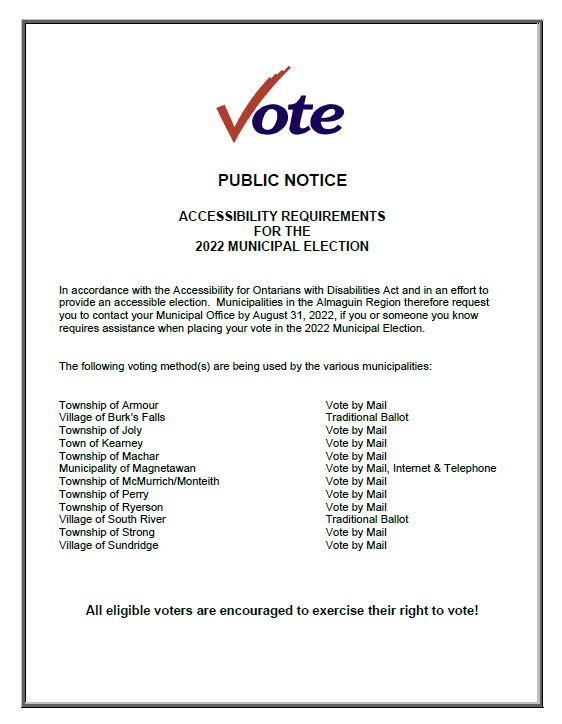Election- For Voters
2022 Candidate Profiles
Mayor
HOPE Chris - Contact: Email
STILL Cathy - Contact: Email \ Phone: 705.382.2505
Councillor
BAPTISTE Ryan - Contact: Email
BRANDT Ashley - Contact: Email \ Facebook
BREAR Debbie - Contact: Email \ Phone: 705.382.1961
COTTON Sean - Contact: Email \ Facebook
L'ECUYER Michelyn - Contact: Email \ Phone: 705.380.3784
SHEDDEN Jim - Contact: Email
TRULSEN, Krista - Contact: Email
WILSON John - Contact: Email \ Phone: 705.382.3514
Are You On the Voter List?
To ensure that you are on the 2026 voters' list RegisterToVoteON
2022 Voters' Guide
The
2022 Voters’ guide for Ontario municipal council and school board elections is available

-
Identification
Voters are required to show proof of their identity and qualifying address. Some common forms of identification that are used include:
- An Ontario driver’s licence.
- An Ontario Health Card (photo card).
- An Ontario Photo Card.
- An Ontario motor vehicle permit (vehicle portion).
- A cancelled personalized cheque.
- A mortgage statement, lease or rental agreement relating to property in Ontario.
- An insurance policy or insurance statement.
- A loan agreement or other financial agreement with a financial institution.
- A document issued or certified by a court in Ontario.
- Any other document from the government of Canada, Ontario or a municipality in Ontario or from an agency of such a government.
- Any document from a Band Council in Ontario established under the Indian Act (Canada).
- An income tax assessment notice.
- A Child Tax Benefit Statement.
- A Statement of Employment Insurance Benefits Paid T4E.
- A Statement of Old Age Security T4A (OAS).
- A Statement of Canada Pension Plan Benefits T4A (P).
- A Canada Pension Plan Statement of Contributions.
- A Statement of Direct Deposit for Ontario Works.
- A Statement of Direct Deposit for Ontario Disability Support Program.
- A Workplace Safety and Insurance Board Statement of Benefits T5007.
- A property tax assessment.
- A credit card statement, bank account statement, or RRSP, RRIF, RHOSP or T5 statement.
- A CNIB Card or a card from another registered charitable organization that provides services to persons with disabilities.
- A hospital card or record.
- A document showing campus residence, issued by the office or officials responsible for student residence at a post-secondary institution.
- A document showing residence at a long-term care home under the Long-Term Care Homes Act, 2007, issued by the Administrator for the home.
- A utility bill for hydro, water, gas, telephone or cable TV or a bill from a public utilities commission.
- A cheque stub, T4 statement or pay receipt issued by an employer.
- A transcript or report card from a post-secondary school.
-
Eligibility
You are eligible to vote in the election for municipal council if you meet all of the following requirements:
- you are a Canadian citizen
- you are aged 18 or older
- you qualify to vote in the municipality
There are three ways that you can qualify to vote in a municipality:
1. As a resident elector if you live in the municipality. You may own, rent, live in shared accommodation where you do not pay rent or live in the municipality but do not have a fixed address. Being a resident elector is the most common type of eligibility.
2. As a non-resident elector if you own or rent property in a municipality, but it’s not the one where you live. You can be a resident elector in only one municipality. However, you can be a non-resident elector in any other municipality (or municipalities) where you own or rent property.
3. As the spouse of a non-resident elector if your spouse owns or rents property in the municipality or municipalities other than the one where you live.
Neither you nor your spouse qualify as a non-resident elector if you do not personally own or rent the property in the municipality. For example, if the property is owned by your business or your cottage is owned by a trust, you would not qualify as a non-resident elector.
If you are not certain whether you qualify as a non-resident elector you should check with the municipal clerk. Under the Municipal Elections Act, 1996, municipal clerks are responsible for conducting elections, and must be satisfied that a person is eligible to vote before adding their name to the voters’ list. Municipal clerks may seek legal advice if they are not certain of a person’s eligibility to vote.
Students
There is a special rule for students who may be living away from home while they attend school. If you are a student and consider your “home” to be the place where you live when you are not attending school (that is, you plan on returning there), then you are eligible to vote in both your “home” municipality and in the municipality where you live while attending school.
Voting in more than one municipality
If you qualify to vote in more than one municipality, you can vote in all of those municipal elections. For example, if you qualify as a resident elector in one municipality, and a non-resident elector in three other municipalities, you can vote in all four of those municipal elections.
The exception to this rule is if two or more of the municipalities are lower-tier municipalities in the same region and voters are electing candidates to the regional council. In that case, you can vote for a regional council office only once.
School board elections
School board elections are held at the same time as municipal elections. You are permitted to vote in the same school board election only once.
You are eligible to vote in the election for a school board if you meet all of the following requirements:
- you are a Canadian citizen
- you are aged 18 or older
- you qualify to vote for that particular school board
School boards can cover large geographic areas that may include several municipalities. School boards are responsible for establishing the geographic areas within the board that one or more trustee positions will be elected to represent.
If you are a resident elector in a municipality, you are eligible to vote for the school trustee(s) that represents the geographic area of the board where you live.
If you live in an unorganized area (instead of a municipality), you may qualify to vote for a school board that has jurisdiction over the unorganized area.
Voting in more than one school board election
You may be eligible to vote in other school board elections in addition to the one where you live.
For example, if you (or your spouse) own or rent residential property in a municipality or an unorganized area different than where you live, you are eligible to vote for a school trustee in this municipality or unorganized area if the trustee sits on a different school board.
Your property must be residential in order for you to qualify to vote. If you (or your spouse) own or rent commercial property in a municipality or unorganized area different than where you live, you are not eligible to vote for school trustee.
Choosing a school board
There are four different kinds of school boards in Ontario:
English-language public school board
English-language separate school board
French-language public school board
French-language separate school board
No matter which school your children go to, you are automatically eligible to vote for the English-language public school board unless you take steps to change and become a supporter of a different kind of board.
The Municipal Property Assessment Corporation (MPAC) keeps the provincial record of school support. If you want to change your school support you must contact MPAC.
Information about how to change your school support can be found on MPAC’s website.
You can also contact the school board that you wish to vote for to get information about changing your school support.
If you want to vote for an English-language separate school board you must meet both of the following requirements:
you must be a Roman Catholic
you or your spouse must be an English-language separate school board supporter
If you want to vote for a French-language public school board you must meet both of the following requirements:
you must be a French-language rights holder
you or your spouse must be a French-language public school board supporter
If you want to vote for a French-language separate school board you must meet all of the following requirements:
you must be a Roman Catholic
you must be a French-language rights holder
you or your spouse must be a French-language separate school board supporter
French-language rights holder is defined in the Education Act, and refers to the right of citizens whose first language is French to receive educational instruction in French.
More information about French-language education is available from the Ministry of Education.
If you voted for a French-language board or an English-language separate board in the last election and you wish to change and vote for an English-language public board in the current election, you must contact MPAC before voting day to change your school support.
Note: You cannot change your school support when you go to vote on voting day.



